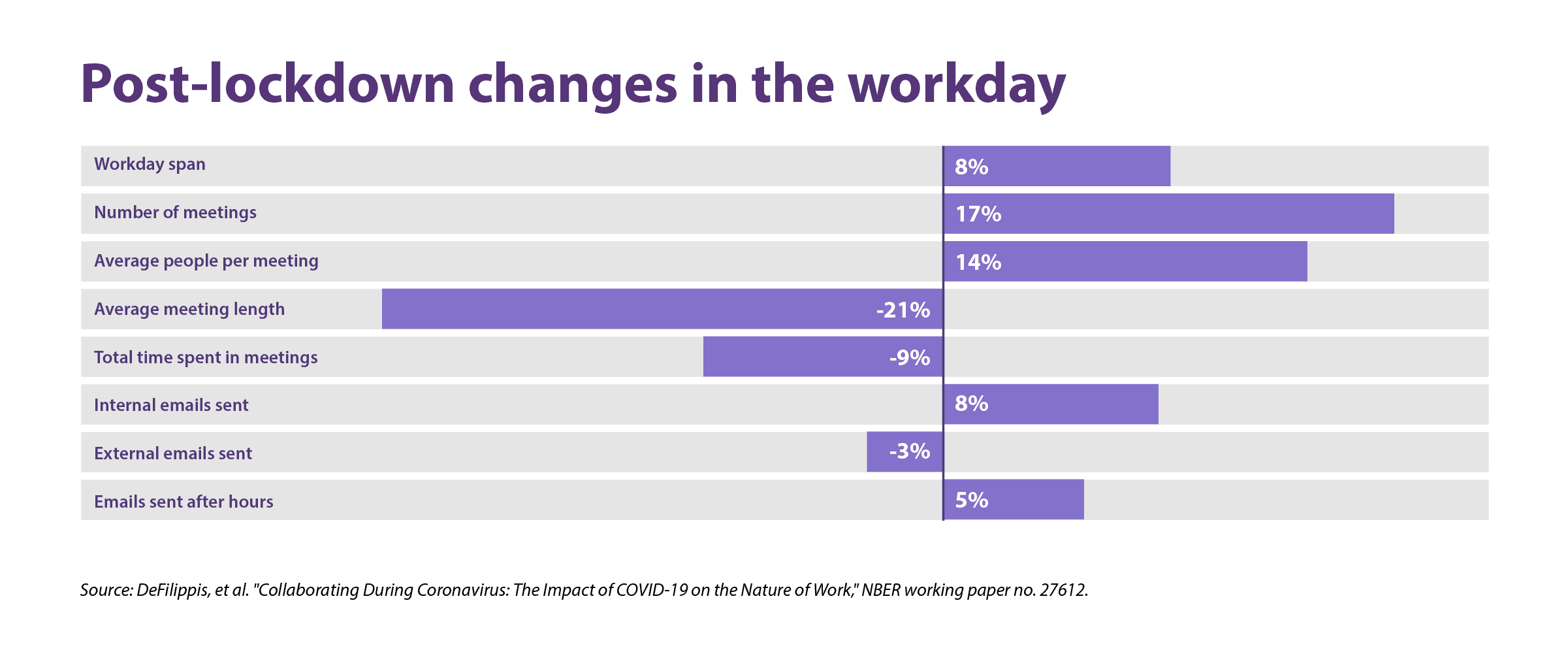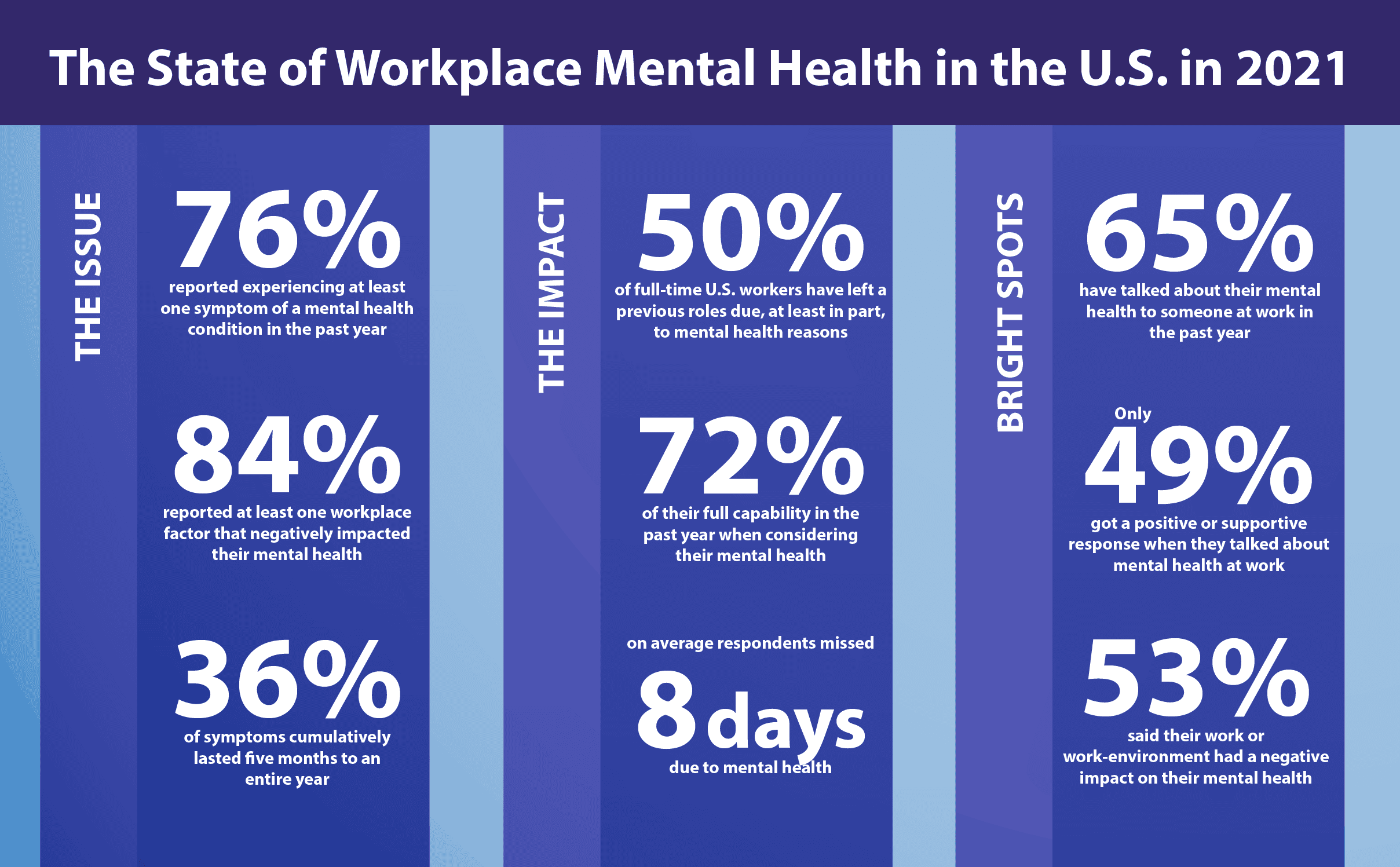Why You Should Make Mental Health at Work Your First Priority?

Summary: It is essential to make time for taking care of your mental health and well-being even while at work, and help others get through it.
Feeling stressed seems synonymous with the times we live in, and studies show that it’s not just because of the pandemic. The dwindling economy, the ongoing war, wildfires and volcanic eruptions, climate change, political uncertainty, and inflation rates are all reasons that instill fear and unsettledness, especially for individuals just beginning their careers. That said, the Center For Disease Control and Prevention (USA) reports that 46% of health workers feel burned out and other mental health challenges in 2022. Despite such a generational shift in awareness towards a rising, global, health concern, very few employees actually feel safe talking about mental health at work without getting stigmatized. What’s causing this stark difference? Let’s find out:
Credits: CBSNews
When the world was working remotely from home during lockdowns, studies showed that the workdays became longer, with more virtual meetings and emails as there was no in-person catching up; and an average professional worked 48 minutes longer than before. Post pandemic, the employee can choose what days to travel to the office under a hybrid work model, which gives them a semblance of normality and choice; but the problem is made worse on the days of working from home. With the continuous increase in work hours, employees often get burned out and sometimes may experience mental breakdowns. Furthermore, employees already struggling with finding a balance between their personal and work lives experience damaging work fatigue which sometimes becomes irreversible with time. Some employers realize the problem much later, due to decreasing performance of their employees – and come up with mental health assistance programs or mental wellbeing-centered activities, despite surveys revealing the blindspots of such initiatives.
It’s like treating a patient’s elbows when they’re complaining of pressure-induced heel pains — completely missing the point. Here’s an example: Many employers enrolled their employees into mental health and wellbeing programs and drives after evaluating mental health diagnosis history and general stress level — categorizing them into people with severe impairments and people who are 100% mentally healthy. However, this categorization couldn’t include the full spectrum of employees struggling with mental health challenges, because of the differences in their experiences, undiagnosed conditions, episodic limitations, and sometimes even symptoms that don’t need clinical attention. So, no one-size-fits-all solution can be attained by direction of approach. In fact, when MindShare Partners’ 2021 Mental Health at Work Report investigated the actual data for employees battling mental health challenges, here’s what it found: 
Credits: MindSharePartners
How Can You, as an Employee, Make it Better?
First, we need to stop overlooking our mental health needs; no matter which side of the equation we are on. And that means acknowledging and not running away from the fact that that your mental well-being needs attention; while remembering that you’re not alone in going through this. Here are a few tips that we hope will help you approach things better:
Prioritize Self-Care as You Prioritize Client Meetings
:
It’s easy to forget to relax your mind and body, especially when you’ve got deadlines to meet; and if you’re a workaholic, these situations occur often. In such cases, you may need to step away from your work, and that’s perfectly human. You can enjoy a short playtime with your pets (they actually can help ease your stress), listen to music, or even do some exercise. This way your mind will be clear and will help you get things done quicker, as well as giving you some time to breathe.
Learn To Create Honest Work Boundaries
:
The next step will be to set boundaries, where you need to be honest with yourself. Now, we understand that when you’re new in a company, you really want to push your boundaries to prove your excellence. But the thing is, being a ‘yes man’ and saying ‘yes’ to everything that comes your way will eventually wear you out and will be counterproductive in your performance report, as well as hard on your mental health.
Instead, experienced professionals say it’s always a good call to say ‘no’ honestly (not abrasively) to both yourself and to your employer when you know that things are starting to overwhelm you.
You can also start to disconnect from work even if it’s for a little while, turning off notifications, and staying away from computers, phones, and work desks. Set aside personal time, where you can do some mindfulness exercises, meditate, or just relax.
Talk It Out With Your Trusted, Inner Circle People
:
A crucial step in itself, reaching out to your loved ones or confidants whom you can open up to can help you lower your stress. These people can help you to seek counseling or, if they’ve experienced similar things, can give you insights from their shared experiences.
Sometimes we may not have a support network and that’s okay too. In this case, you may have to engage with your colleagues beyond your everyday work and with time build a meaningful rapport with them. Sometimes, if you’re working in a private office coworking space, fostering such networking communities can be easier than in other places, but in the end: it’s a two-way process that takes time, effort, and patience.
What Can You Do as an Employer To Help?
Mental health needs to be perceived through different lenses, based on the unique, deeper, experience of your employees. This will help you look beyond the overly normalized employee mental wellbeing programs and get closer to the root causes. Here are a few strategic tips that can help you bring a meaningful change:
Provide a Safe Space Where Employees Can Talk
:
At the bare minimum, as an employer, you need to ensure your employees have clear, confidential, communication. Companies like Verizon Media, RetailMeNot, etc. often conduct anonymous surveys with existing employees to fill in the details or lack of any early mental health concerns or symptoms in their employees. You can also provide your employees with knowledgeable mental health resources that can help them identify and empower them to be bold enough to speak out on any issues or conflicts they may have been struggling with.
Build an Inclusive Culture
:
Something that needs a lot of careful thought, time, and kindness — it’s interesting how DEI (diversity, equity, and inclusion) is becoming essential in building a safe, healthy workspace. When your employees feel seen, heard, and cared for, employers become key allies, and your workforce starts working together as a cohesive unit. A workspace environment where employees disclosing their vulnerability is perceived as bravery and not weak is a great way of fighting the stigma of mental health issues.
What Do Studies Say About Coworking and Mental Health?
The American Psychological Association defines a healthy workplace as an environment that incorporates work-life balance, provides for the health and safety of employees, and promotes growth and development while involving and recognizing their efforts — something that also defines an inclusive ecosystem. Currently, a lot of research is underway studying the mental wellbeing scope in a coworking space, given its unique habitat that perfectly integrates different workstyles and gives them equal opportunities in learning and exposure for networking (also an integral part of inclusion). Researchers have identified deeper, intrinsic, elements in coworking that are more intertwined with promoting mental health balance than just inclusion or access to technology, some of which are:
Your Personal Work Zen
:
Work-life balance is hard to attain, and the situation doesn’t improve even when you’re working from the office irrespective of the amount of breaks and water cooler conversations you have. And when it comes to working from home, things just get worse. Research shows that having separate, dedicated, areas of work and relaxation within your reach can improve your focus, and efficiency, and help you de-stress. The freedom of flexibility and connecting with like-minded professionals across different industries, businesses, etc. can be an excellent motivator to preserve your mental wellbeing while giving you opportunities to foster value-based acquaintances. This separation of work and life can also be a good starting point for someone struggling to set work and personal boundaries.
Origins of Isolation vs Interaction
:
For a freelancer, working can get lonely; while for an employee in a team, working from the office can get overwhelming because of the preset routine. Coworking’s game-changing factor of flexibility, where you choose your own schedule, empowers professionals in both the cases above and thus maximizes their productivity. Furthermore, since coworking spaces are designed for building communities and promoting collaboration, it’s often easy for employees to personalize their work zone as per their preferences. The relaxation areas in these unique workspaces have interiors set by default to drive interactions, sometimes even without much effort. For example, our shared office space in Kolkata is based on the concept of a dynamic coworking environment, complete with thoughtful, intelligently designed, areas for activities, meetings, and collaboration.
Building a culture of connection is key to cutting off the ugly head of mental health taboos at work. And then realizing it’s possible to change to a world where neither the employee nor the employer can continue to devalue mental health concerns is the best news. Every one of us has a role to play in this and to remember to be kind to ourselves in the process.


